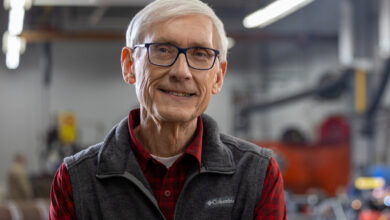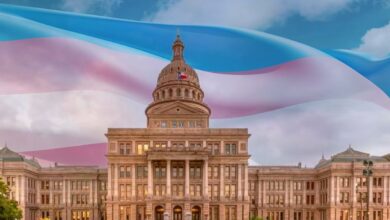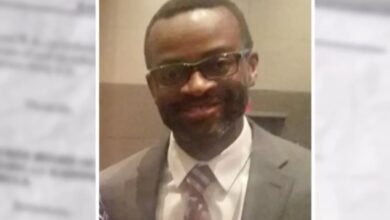
Mayor Pete’s Unlikely Rise as a Symbol of LGBTQ Progress
"Buttigieg represents change in many ways in a primary where voters want just that."

By Dan Merica, CNN
Before South Bend, Indiana, Mayor Pete Buttigieg captured the nation’s attention as a serious contender for the 2020 Democratic nomination, he was in Iowa, laying the groundwork for his forthcoming bid.
Addressing a gathering of progressive activists, Buttigieg, who is gay and married to his husband, Chasten, reflected on the impact decisions made in Washington have had on his life.
“Sitting down to Christmas dinner at the side of my husband, whose marriage to me, our family — not its well-being but its existence — comes by the grace of single vote on the United States Supreme Court,” he said in December.
After the event, a group of women mingled near the elevators and reflected on their first impression of the South Bend mayor.
“I like that Mayor Pete guy,” one woman standing near the elevator said to the others. “He’s gay and going places.”
In the months since, Buttigieg went from the obscure mayor of a small city to a standout contender within the Democratic field of candidates looking to take on President Donald Trump next year. And being gay, while not the entirety of Buttigieg’s story, is a key aspect of his identity, something that voters say sets him apart from the other candidates and something that Buttigieg has highlighted more as he began to rise in prominence. His campaign has worked to seize on his newfound status in recent weeks by tapping into LGBT communities for support and money.
His swift rise as the only member of the LGBT community in the race has also prompted a broader conversation about the importance of his identity and the progress made on LGBT rights in the course of just a decade.
“The fact that his sexual orientation is not the headline, that he is being received as a credible qualified candidate for president, just as all the others are, is without question is a profound sign of our progress,” said Chad Griffin, president of the Human Rights Campaign, the largest LGBT advocacy group in the United States.
‘Not eager to become a poster child’
All of it is a bit of an adjustment for the mayor, who once wrote that he came out later in life, in part, because he didn’t want to become “a poster child for LGBT issues.”
In “Shortest Way Home,” the mayor’s pre-campaign memoir, Buttigieg writes that he worried his coming out would turn into something he is not.
“I had strongly supported the causes from the beginning, but did not want to be defined by them,” he wrote.
Speaking at the Victory Fund National Champagne Brunch in Washington, DC, on Sunday, an event that is meant to raise money for LGBTQ candidates across the country, Buttigieg took that a step further and told attendees that dealing with his sexual orientation was “a kind of war.”
“If you could have offered me a pill that could make me straight, I would have swallowed it before you could give me a swig of water,” Buttigieg said. “It’s a hard thing to think about now. If you had shown me exactly what it was that made me gay, I would have cut it out with a knife.”
He added later: “Thank God there was no pill. Thank God there was no knife.”
Buttigieg goes on to write in his memoir that it was his deployment to Afghanistan in 2014 that forced him to come to terms with his public and private life. Despite the fact that Buttigieg, as a student at Harvard, used the earliest iterations of Facebook to see which men identified as “seeking men” on the site, it wasn’t until he reflected “on the possibility that I might get killed in action, thirty-two years old, single for basically all my adult life” that he realized he “needed to come out.”
He did so in a June 2015 essay in the South Bend Tribune, where he nodded to the fact that the Supreme Court would soon decide on whether gay marriage was legal nationally by writing that he felt his public coming out “could do some good” for people struggling with their sexuality.
As the only gay candidate in the race, Buttigieg has also been asked questions that other candidates haven’t had to address.
During an appearance on The Breakfast Club in March, Buttigieg was asked about how he feels about Chick-fil-A, a chicken-centric fast food company that has faced criticism — and, in some cases, boycotts — from gay rights advocates for its donations to anti-gay groups and anti-gay comments by Chick-fil-A president Dan Cathy.
“I do not approve of their politics, but I kind of approve of their chicken,” Buttigieg said. He later added at another event that while he supports people’s right to boycott companies and spend their money however they please, he worries it leads people to “sometimes slip into a sort of virtue signaling in some cases where we’re not really being consistent.”
It was a nuanced view on a controversial subject within the LGBT community and was not universally well received.
“It riled people in the LGBTQ community,” Annise Parker, the head of Victory Fund and the former mayor of Houston who was one of the first gay mayors of a major US city when she was elected in 2010, said of Buttigieg’s comments about Chick-fil-A. “There are certainly folks on the left of the community who say that is not good enough. But I think that is one of the things that has caused a lot of folks to take another look at Pete is that he is a bridge builder, mainstream, middle of the road politician and he wants to find a balance and a position of fairness.”
Even if Buttigieg wasn’t looking to draw attention to his sexuality, it has found him during the presidential campaign. And that he is gay, in the eyes of gay rights advocates and political operatives, could be an asset.
“One reason Obama had a lot of success in 2008 was that he represented change in many ways,” said Robby Mook, Hillary Clinton’s 2016 campaign manager and the first gay man who ran a major presidential campaign. “I think Buttigieg represents change in many ways in a primary where voters want just that.”
Mook added: “All the gay men I know, they all want to give him money. It’s not the worst demographic to raise money from.”
Polling bears this out — a recent NBC/Wall Street Journal poll found nearly 70% of American are either enthusiastic or comfortable with a candidate who is gay or lesbian — but it is still remarkable to those gay lawmakers who paved the way for a Buttigieg campaign.
Former Rep. Barney Frank, who came out in 1987 and was, at the time, widely considered the most prominent gay politician in the United States, said during his decades in politics he never viewed his sexuality as an asset. For Buttigieg, however, it could be, he said, because it allows people who have had homophobic views in the past to atone at the ballot box.
“His candidacy is an example of the absolute speed with which we are getting there. I think it is very clear, his being gay is clearly an asset,” Frank said. “In a way, he gives people a chance to almost atone for past wrongs.”
For those LGBTQ voters who have come to Buttigieg events, some because they support him and others because they are curious about a gay man running for president, the symbolism in Buttigieg’s rise is powerful.
“I think it matters because symbolism is important. I think having that reflected in your leaders is important,” said Adi Dubash, 37, who attended a Buttigieg event in South Carolina last month with his husband, Michael Upshaw, 34, and their 16-month-old son Finnick. “But I think he has got the right idea because he embraces his identity and he wants people to know his identity but it is not all who he is.”
For Upshaw, Buttigieg’s presidential bid is about representation, he said, and being able to tell their young son that “your dads are represented” and “you are growing up in a world that accepts people and families like you are growing up in.”
“That means a lot,” he added.
Radical normalcy
One area in which gay rights activists are most pleased by Buttigieg’s campaign is the way that his marriage to Chasten Buttigieg, a now ever-present figure on the campaign trial, has given increased visibility to the normalcy of same-sex marriage.
Chasten, 29, has seen his online following balloon from a few thousand Twitter followers months ago to nearly 200,000 this month. He and his husband regularly tweet about the normalcies of life: Doing laundry on the weekend, reading on the couch and their two dogs.
“Doing a quick bit of laundry. Hear loud scream. Run into kitchen terrified, expecting to see @Chas10Buttigieg in pool of blood. Am thereupon informed that @Lin_Manuel is following my husband, whose life is now complete,” Pete Buttigieg tweeted last month after the Hamilton star followed his husband on Twitter.
Buttigieg reflected on his marriage at Sunday’s brunch.
“Being married to Chasten has made me a better man,” Buttigieg said, before the turned his focus on Vice President Mike Pence, the former governor of Indiana who has a long history of comments of opposing same-sex marriage.
“And yes Mr. Vice President it has made me closer to god,” Buttigieg said as the crowd gave him a standing ovation. “If you have a problem with who I am, your problem is not with me. Your quarrel, sir, is with my creator.”
Pete and Chasten met online and the mayor proposed to his husband-to-be in 2017 at Chicago’s O’Hare International Airport, the spot where Chasten, a teacher, was sitting when they first connected on the dating app Hinge.
The mere fact that the two are living their lives so openly on the political stage is a moment in the eyes of Parker, the head of Victory Fund and the former mayor of Houston.
“I have been an activist since the 70s and if you had asked me back then if we would have had a gay married man running for president, I would have thought you were crazy,” Parker said.
But it’s the rise of Chasten Buttigieg’s popularity that has really marveled men and women in the LGBTQ community, a rise that was recently cemented by the fact that the political spouse headlined the Human Rights Campaign annual gala in Houston on Saturday, hours before his husband headlined the Victory Fund event in Washington, DC.
And Chasten Buttigieg, who came out at 18 and moved out of his home shortly after, has embraced the spotlight — from the comical, like tweeting the hosts of Netflix’s “Queer Eye” asking them to take him shopping, to the serious, like when he tweeted “your time in the closet and your journey to coming out belong to you. … You matter first.”
For Frank, who married his longtime partner James Ready in 2012, making him the first gay politician to be married in office, the prominence of this LGBTQ couple has been remarkable.
“I got married, seven years ago. It was international news when I announced that I was getting married,” Frank said in an interview. “It was, to quote Joe Biden, a BFD. Now, the fact that Pete is married isn’t a big deal. A BFD to an NBD in seven years. … It’s a sign of enormous progress.”











Comments